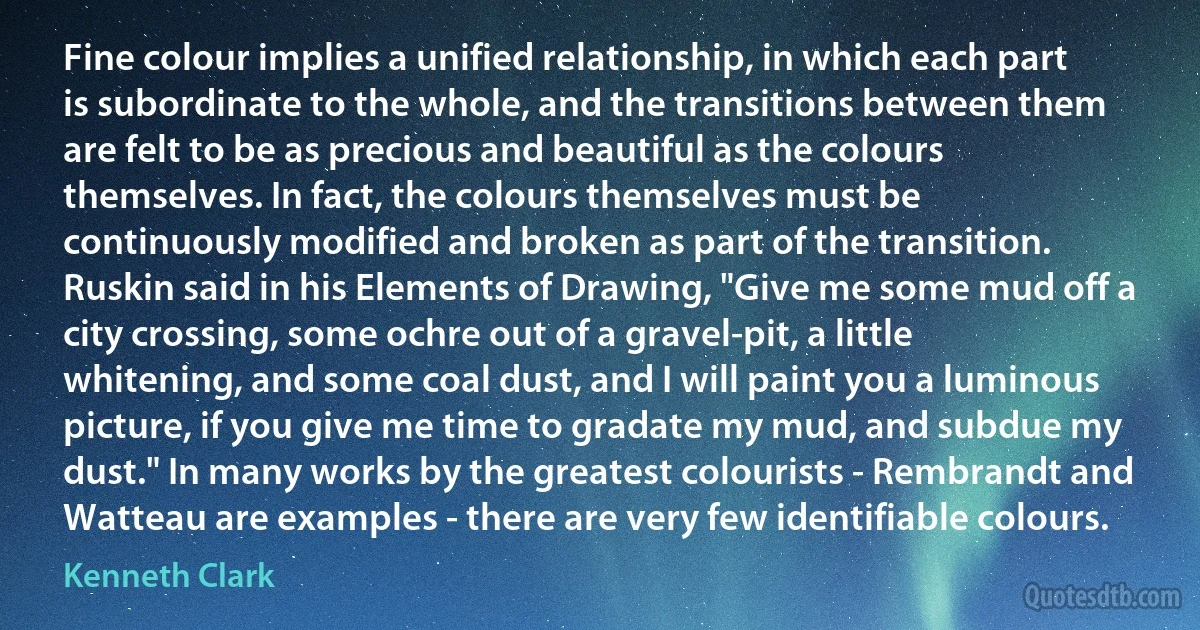
Fine colour implies a unified relationship, in which each part is subordinate to the whole, and the transitions between them are felt to be as precious and beautiful as the colours themselves. In fact, the colours themselves must be continuously modified and broken as part of the transition. Ruskin said in his Elements of Drawing, "Give me some mud off a city crossing, some ochre out of a gravel-pit, a little whitening, and some coal dust, and I will paint you a luminous picture, if you give me time to gradate my mud, and subdue my dust." In many works by the greatest colourists - Rembrandt and Watteau are examples - there are very few identifiable colours.
Kenneth ClarkRelated topics
beautiful city crossing dust felt few fine modified mud off paint picture precious say subordinate time transition works ruskin colours rembrandtRelated quotes
Some students of philosophy have unreasonably high expectations of the subject. They expect it to provide them with a complete and detailed picture of the human predicament. They think that philosophy will reveal to them the meaning of life, and explain to them every facet of our complex existences. Now, although studying philosophy can illuminate fundamental questions about our lives, it does not provide anything like a complete picture, if indeed there could be such a thing. Studying philosophy isn't an alternative to studying art, literature, history, psychology, anthropology, sociology, politics, and science.

Nigel Warburton
It is almost irresistible for humans to believe that we have some special relation to the universe, that human life is not just a more-or-less farcical outcome of a chain of accidents reaching back to the first three minutes, but that we were somehow built in from the beginning. ... It is very hard to realise that this is all just a tiny part of an overwhelmingly hostile universe. It is even harder to realise that this present universe has evolved from an unspeakably unfamiliar early condition, and faces a future extinction of endless cold or intolerable heat. The more the universe seems comprehensible, the more it also seems pointless.

Steven Weinberg
I have presented the periodic table as a kind of travel guide to an imaginary country, of which the elements are the various regions. This kingdom has a geography: the elements lie in particular juxtaposition to one another, and they are used to produce goods, much as a prairie produces wheat and a lake produces fish. It also has a history. Indeed, it has three kinds of history: the elements were discovered much as the lands of the world were discovered; the kingdom was mapped, just as the world was mapped, and the relative positions of the elements came to take on a great significance; and the elements have their own cosmic history, which can be traced back to the stars.

Peter Atkins
Do everything simply and meekly. Do nothing with an ulterior motive. Don't say, I'll do this in order to have that result, but do it naturally, without taking cognizance of it. That is, pray simply and don't think about what God will bestow on your soul. Don't make any calculations. You know, of course, what God bestows when you enter into communion with Him, but it is as if you don't know. Don't discuss the matter even with yourself. So when you repeat the prayer, "Lord Jesus Christ, have mercy on me”, say it simply and ingenuously and think of nothing other than the prayer. These are very delicate matters and the intervention of the grace of God is required.

Porphyrios of Kafsokalyvia
My choice of colors does not rest on any scientific theory; it is based on observation, on feeling, on the very nature of each experience. I.... merely try to find a color that will fit my sensation. There is an impelling proportion of tones that can induce me to change the shape of a figure or to transform my composition. Until I have achieved this proportion in all the parts of the composition I strive towards it and keep on working. Then a moment comes when every part has found its definite relationship, and from then on it would be impossible for me to add a stroke to my picture without having to paint it all over again.

Henri Matisse
